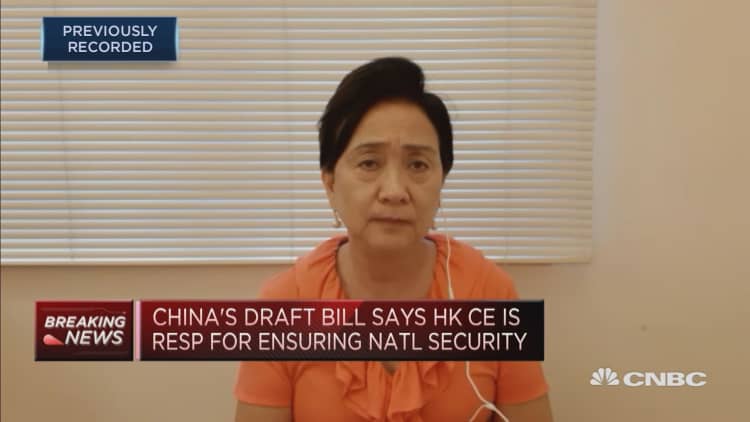China will continue to defend its "national sovereignty and territorial integrity" in the face of pressure from the U.S., the vice president of a Beijing-based think tank said this week.
His comments come amid criticism from the U.S. over plans for a new Hong Kong national security law that was introduced last week as China's parliament, the National People's Congress, kicked off its annual session. The bill has already sparked protests in Hong Kong, with some concerned that it will give Beijing more control over the city, which is a special administrative region of China.
"China and the United States need to talk as equals on equal terms by respecting each other, rather than one country believing in imposing its will onto the other country," Victor Gao of the Center for China and Globalization said on Tuesday.
U.S. Secretary of State Mike Pompeo said the proposal would be a "death knell" for Hong Kong's autonomy, while White House National Security Advisor Robert O'Brien said America is likely to impose sanctions on China if the law is passed.
Former lawmaker from Democratic Party, Emily Lau, said Hong Kong is "very anxious, angry and frightened," and big companies are "nervous" about the move.
But Gabriel Wildau, senior vice president at Teneo Risk Advisory, said the bill's impact on large businesses will be limited, and the city will still have an edge over its competitors.
"Even after this law, if enacted, Hong Kong is very likely to maintain the significant advantages it has enjoyed over the last several decades in the Asia Pacific region, compared to its would-be rivals like Singapore or Shanghai, as the main regional, business and financial hub," he added.

Gao told CNBC's "Capital Connection" that China needs to stand firm on matters of principle and of sovereignty "no matter" what pressure comes from the U.S.
"I hope Washington will calm down. Hong Kong is not part of the United States, Hong Kong is not a separate independent country," he said.
Hong Kong is governed under the "one country, two systems" framework, which gives the territory more freedoms than the mainland. It is meant to last for 50 years from 1997, when the city was returned to China by the British.
Gao, who previously served as a translator for the late Chinese leader Deng Xiaoping, said issues between the U.S. and China can be resolved in "amicable ways," but there was "no way" treating China like a "banana republic" would work. The term banana republic refers to a poor and badly ruled country.
"There are people in Washington who need to wake up to the fact that they should not indulge in fantasies anymore, that by putting more pressure on China, China will cave in," he said. "China will be more resilient against such pressure."

— CNBC's Jasmine Kim, Weizhen Tan and Yen Nee Lee contributed to this report.


